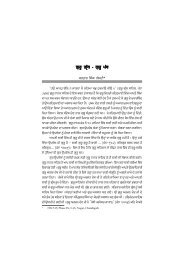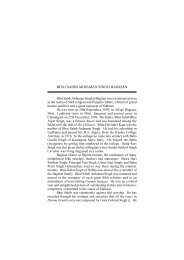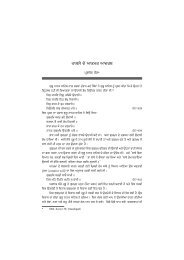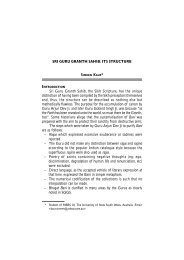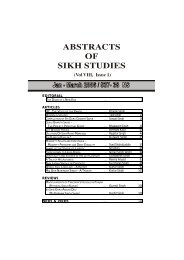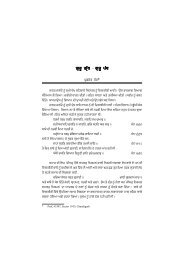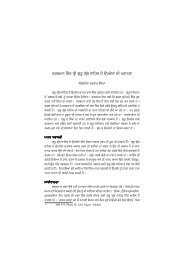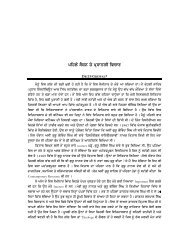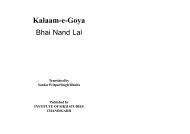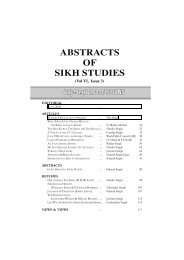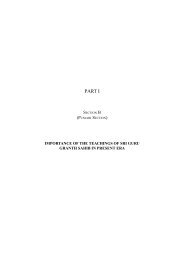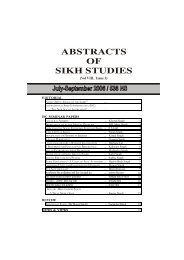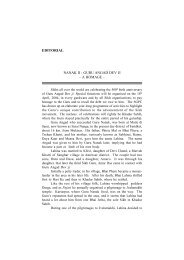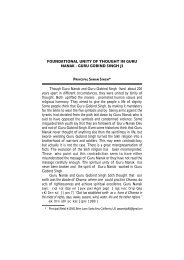editorial articles reviews news & views - Institute of Sikh Studies
editorial articles reviews news & views - Institute of Sikh Studies
editorial articles reviews news & views - Institute of Sikh Studies
You also want an ePaper? Increase the reach of your titles
YUMPU automatically turns print PDFs into web optimized ePapers that Google loves.
PUNJAB RIVER WATERS – UNLAWFUL AND UNJUST DISTRIBUTIONS<br />
55<br />
economy. No doubt, the lands <strong>of</strong> other states need waters for irrigation,<br />
but it should not be at the cost <strong>of</strong> Punjab, particularly when other<br />
states have no legal claim to it. The Government. <strong>of</strong> India, with the<br />
vast resources at its command, should tap other resources in this<br />
regard, like canalizing the Ghagar river waters and the Yamuna river,<br />
etc, to which these states may have valid claim. The distribution <strong>of</strong><br />
Punjab river waters to these states is unlawful, unjust and<br />
unconstitutional.<br />
Constitution <strong>of</strong> India separates the powers <strong>of</strong> the union and the<br />
states. India is a union <strong>of</strong> states as defined in Article 1 <strong>of</strong> the<br />
Constitution. Schedule VII <strong>of</strong> the Constitution gives the state list,<br />
and the subject <strong>of</strong> river waters is included in it at entry 17. Article<br />
246 <strong>of</strong> the Constitution lays down that the states have the exclusive<br />
jurisdiction over the subjects enumerated in the state list, while union<br />
has exclusive jurisdiction over the subjects <strong>of</strong> the union list. Punjab<br />
river waters are thus under the control <strong>of</strong> Punjab state and its<br />
legislature, exclusively. Govt <strong>of</strong> India and Parliament having no<br />
jurisdiction over it. The distribution <strong>of</strong> Punjab river waters by the<br />
Prime Minister Indira Gandhi obviously violates these constitutional<br />
provisions and is, as such, unconstitutional and void, having no binding<br />
effect.<br />
Similarly the sections 78 to 80 <strong>of</strong> Punjab Reorganization Act I<br />
and section 14 <strong>of</strong> Inter State River Waters Disputes Act 1956 are<br />
unconstitutional, as the Parliament has no jurisdiction over Punjab<br />
river waters. These unconstitutional provisions do not confer any<br />
legal powers on Govt <strong>of</strong> India to intervene in Punjab river waters.<br />
The Eradi tribunal set up under section 14 <strong>of</strong> the Inter State River<br />
Waters Disputes Act automatically becomes illegal when this section<br />
is held unconstitutional. This Act can have no application to Punjab<br />
river waters, being not inter-state rivers as these flow in the Punjab<br />
territories, and not in any other state to which these waters have been<br />
distributed.<br />
Punjab has the exclusive right to Punjab river waters on the basis<br />
<strong>of</strong> riparian law. The other states to which these waters have been<br />
distributed are non-riparian, having no valid claim to it The riparian<br />
law is based upon justice and equity, having international acceptance.<br />
It has been approved by the United Nations. In India it has been



